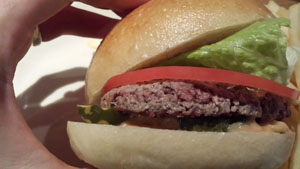The Cornucopia Institute is neutral in terms of people’s dietary choices. Our supporters’ dietary choices range from omnivores, vegetarians who consume dairy and eggs, vegans, to 100% raw.
 |
But we are not neutral in terms of the quality of the food we recommend. The Impossible Burger is a plant-based and vegan burger alternative, now available in many Burger King chains in the U.S. To meet the volume requirements for such a roll-out, Impossible Foods produces its beef alternative with Roundup Ready soybeans.
GMO and conventional soy is implicated in deforestation and destruction of habitat to a great degree. Soy of this kind is extremely toxic to produce, using large amounts of pesticides.
Perhaps to take the focus off this controversial reformulation, the company’s 2019 Impact Report referred to regenerative grazing as “the ‘clean coal’ of meat.”
As Cornucopia has addressed in other work, one has to look at the whole picture when comparing the total environmental effect of food: land-use, chemical and pharmaceutical use, implications for biodiversity, and so on. The article below offers further considerations regarding the meaning of food.
Monoculture fields have taken over great tracts of land in the U.S., and so-called “efficiencies of scale,” coupled with government crop subsidies, make this kind of agriculture profitable–despite significant health costs to the environment, wildlife, and humans.
Unlike the Impossible Burger, organic, grass-based livestock are raised entirely without the use of synthetic pesticides or GMOs of any kind. Regenerative agriculture is premised on soil health, and livestock are typically only one aspect of a holistic farm system.
It is true that one could not “feed the world” at the current rates of meat consumption using regenerative grazing techniques. What Impossible Foods fails to state is that this is okay: for many individuals, eating less but higher quality meat is a positive choice.
Whatever your dietary choices, it’s important to look beyond marketing schemes. We encourage eaters with a plant-based diet to look into making homemade vegan and vegetarian burgers—they can be delicious, nutritious, and transparent in all their ingredients.
Fake Food, Fake Meat: Big Food’s Desperate Attempt to Further the Industrialisation of Food
Independent Science News
by Dr. Vandana Shiva
Food is not a commodity, it is not “stuff” put together mechanically and artificially in labs and factories. Food is life. Food holds the contributions of all beings that make the food web, and it holds the potential of maintaining and regenerating the web of life. Food also holds the potential for health and disease, depending on how it was grown and processed. Food is therefore the living currency of the web of life.
As an ancient Upanishad reminds us “Everything is food, everything is something else’s food. “
Good Food and Real Food are the basis of health .
Bad food, industrial food, fake food is the basis of disease.
Hippocrates said “Let food be thy medicine”. In Ayurveda, India’s ancient science of life, food is called “sarvausadha” the medicine that cures all disease.
Industrial food systems have reduced food to a commodity, to “stuff” that can then be constituted in the lab. In the process both the planet’s health and our health has been nearly destroyed.

